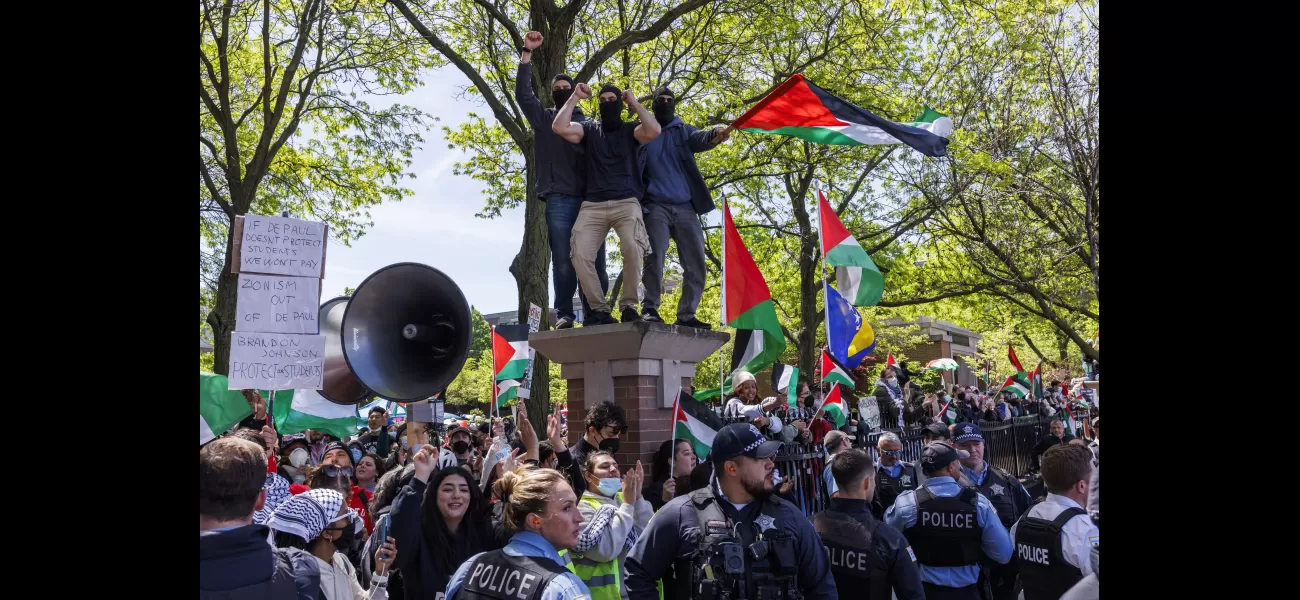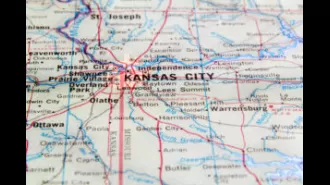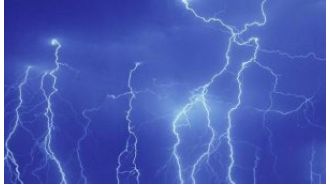DePaul pro-Palestine camp and counterprotesters clash in escalating tensions.
Jewish organizations held a demonstration to support Jewish students at DePaul and promote a sense of safety.
May 5th 2024.

On a sunny Sunday morning, a group of individuals organized by the Chicago Jewish Alliance gathered at the intersection of Fullerton and Seminary avenues. Their purpose? To protest the recent encampment set up at DePaul University in response to the war in Gaza.
The demonstration was supported by various groups such as Chabad Lincoln Park, Stand With Us, Hillel Metro Chicago, and the Jewish Institute for Liberal Voices. They all came together with the goal of making Jewish DePaul students feel safer in their own community. As they stood together, they proudly waved both Israeli and American flags.
Doreen Helmer, a resident of Northbrook, traveled all the way to Lincoln Park to attend the counter-rally. She expressed her concern for the safety of Israel, especially in light of the increasingly hostile environment. She stated that it was heartbreaking to see the impact of these protests on their city and how it was affecting the daily lives of her friends. She firmly believed that this was not a matter of free speech, but rather a destructive force disrupting their peace.
Helmer shared an incident where she was driving to the encampment with an Israeli flag flying from her car when someone tried to tear it off. This only reinforced her determination to stand up for Israel and defend it against any threats.
Meanwhile, Henna Ayesh, one of the organizers and media liaison for the DePaul encampment, expressed her pride in how the encampment protesters were handling the counterprotesters on campus. She mentioned that the leaders had been conducting "de-escalation training" multiple times a day to teach them how to interact with counterprotesters.
As members of the encampment locked arms around the quad, facing the counterprotesters, the Chicago police formed two lines to separate the two groups. Ayesh, a Palestinian student herself, shared her admiration for the self-sustaining community that had arisen within the encampment. She explained that the organizers had instructed the protesters not to engage with the counterprotesters, and for the most part, they had respected that request. She emphasized that the community's strength lay in their ability to keep each other safe, not relying on the authorities or administration.
However, Ayesh did mention one instance of confrontation when a counterprotester hit a Palestinian student in the face with a flag. The student received medical attention and is now doing well.
As the day progressed, a smaller group of counterprotesters stood across from DePaul's quad on Fullerton Avenue, while another group gathered on the music lawn at Halsted Street and Fullerton Avenue. They had brought snacks, posters, and flags, and cars honked in support as they drove by. Children holding Israeli flags stood at the entrance of the lawn.
By Sunday afternoon, the encampment protesters had been moved inside the quad, but some continued to gather around the entrances, holding onto fences while facing the counterprotesters. The participants also gathered around a large stage in the middle of the encampment, chanting and drumming, waving Palestinian flags.
Ayesh revealed that the encampment organizers had negotiated with DePaul administrators before setting up the encampment. They had been informed that the university was invested in companies affiliated with Israel. The group decided to put up tents when the administrators stated that they did not have the power to terminate those investments. However, despite their efforts, they had not received any response from the administrators since Wednesday.
Meanwhile, DePaul University had sent out an alert, advising students to avoid the quad and use alternate routes on campus. However, on campus, the atmosphere remained calm as students enjoyed activities such as playing soccer and reading outside their residence halls and school buildings.
In another encouraging development, the encampment organizers at the School of the Art Institute announced that all 68 individuals who were arrested at a demonstration on Saturday had been released on Sunday morning.
These encampments are just a few of the many across Chicago and the nation at various colleges, including the University of Chicago, Columbia University, and the University of Illinois at Urbana-Champaign. They have been set up in response to the rising death toll in Gaza, with over 34,000 Palestinians killed according to the Hamas-run Health Ministry.
The war in Gaza was triggered by Hamas' attack on southern Israel, resulting in the death of 1,200 people and the taking of 250 hostages. While President Joe Biden has defended the right to protest, he has also emphasized the need for order and safety at college campuses. The Jewish community in Chicago has demanded action from local universities to prevent hate speech and maintain peace within their campuses.
The demonstration was supported by various groups such as Chabad Lincoln Park, Stand With Us, Hillel Metro Chicago, and the Jewish Institute for Liberal Voices. They all came together with the goal of making Jewish DePaul students feel safer in their own community. As they stood together, they proudly waved both Israeli and American flags.
Doreen Helmer, a resident of Northbrook, traveled all the way to Lincoln Park to attend the counter-rally. She expressed her concern for the safety of Israel, especially in light of the increasingly hostile environment. She stated that it was heartbreaking to see the impact of these protests on their city and how it was affecting the daily lives of her friends. She firmly believed that this was not a matter of free speech, but rather a destructive force disrupting their peace.
Helmer shared an incident where she was driving to the encampment with an Israeli flag flying from her car when someone tried to tear it off. This only reinforced her determination to stand up for Israel and defend it against any threats.
Meanwhile, Henna Ayesh, one of the organizers and media liaison for the DePaul encampment, expressed her pride in how the encampment protesters were handling the counterprotesters on campus. She mentioned that the leaders had been conducting "de-escalation training" multiple times a day to teach them how to interact with counterprotesters.
As members of the encampment locked arms around the quad, facing the counterprotesters, the Chicago police formed two lines to separate the two groups. Ayesh, a Palestinian student herself, shared her admiration for the self-sustaining community that had arisen within the encampment. She explained that the organizers had instructed the protesters not to engage with the counterprotesters, and for the most part, they had respected that request. She emphasized that the community's strength lay in their ability to keep each other safe, not relying on the authorities or administration.
However, Ayesh did mention one instance of confrontation when a counterprotester hit a Palestinian student in the face with a flag. The student received medical attention and is now doing well.
As the day progressed, a smaller group of counterprotesters stood across from DePaul's quad on Fullerton Avenue, while another group gathered on the music lawn at Halsted Street and Fullerton Avenue. They had brought snacks, posters, and flags, and cars honked in support as they drove by. Children holding Israeli flags stood at the entrance of the lawn.
By Sunday afternoon, the encampment protesters had been moved inside the quad, but some continued to gather around the entrances, holding onto fences while facing the counterprotesters. The participants also gathered around a large stage in the middle of the encampment, chanting and drumming, waving Palestinian flags.
Ayesh revealed that the encampment organizers had negotiated with DePaul administrators before setting up the encampment. They had been informed that the university was invested in companies affiliated with Israel. The group decided to put up tents when the administrators stated that they did not have the power to terminate those investments. However, despite their efforts, they had not received any response from the administrators since Wednesday.
Meanwhile, DePaul University had sent out an alert, advising students to avoid the quad and use alternate routes on campus. However, on campus, the atmosphere remained calm as students enjoyed activities such as playing soccer and reading outside their residence halls and school buildings.
In another encouraging development, the encampment organizers at the School of the Art Institute announced that all 68 individuals who were arrested at a demonstration on Saturday had been released on Sunday morning.
These encampments are just a few of the many across Chicago and the nation at various colleges, including the University of Chicago, Columbia University, and the University of Illinois at Urbana-Champaign. They have been set up in response to the rising death toll in Gaza, with over 34,000 Palestinians killed according to the Hamas-run Health Ministry.
The war in Gaza was triggered by Hamas' attack on southern Israel, resulting in the death of 1,200 people and the taking of 250 hostages. While President Joe Biden has defended the right to protest, he has also emphasized the need for order and safety at college campuses. The Jewish community in Chicago has demanded action from local universities to prevent hate speech and maintain peace within their campuses.
[This article has been trending online recently and has been generated with AI. Your feed is customized.]
[Generative AI is experimental.]
0
0
Submit Comment





